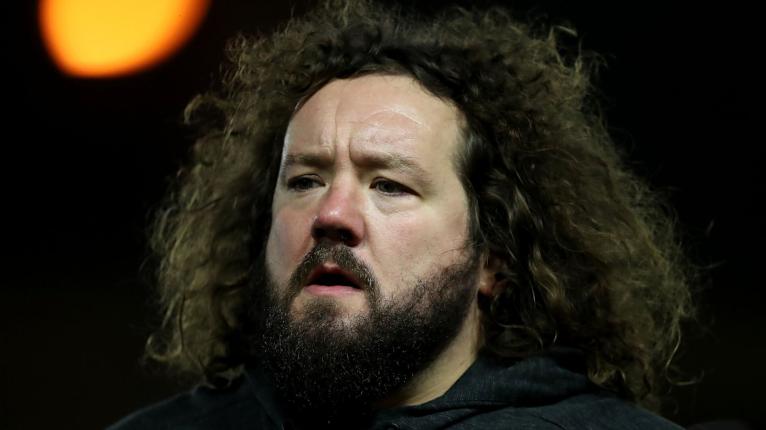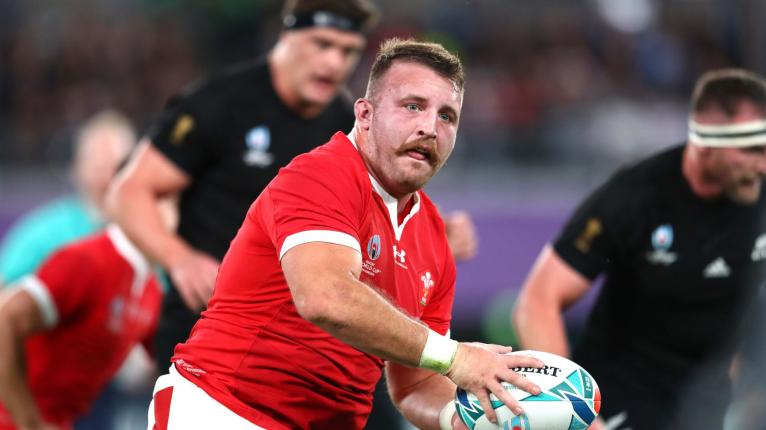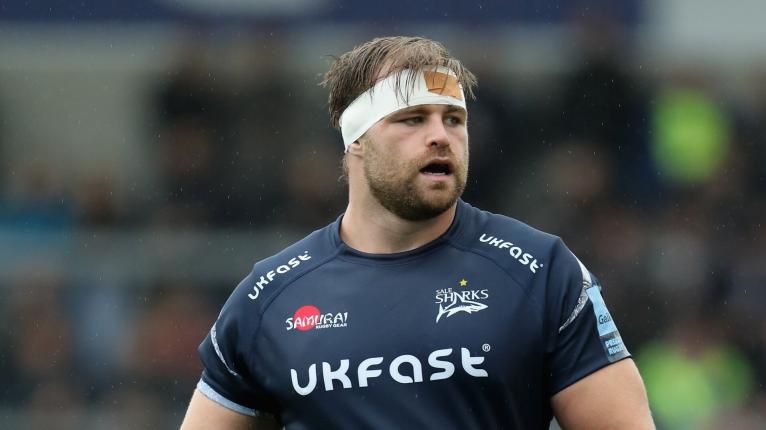What Adam Jones looks for in a tighthead

Life is full of quirky coincidences. When Tomas Francis, a cherubic hulk of a man, was discovered by Brett Davey, at Doncaster Knights, his Welsh coach was only privy to his tighthead’s Celtic origins after the young tighthead broke down in the changing rooms after finding out about family bereavement.
As it transpired, after some gentle interrogation, he found Francis’ grandmother had passed away and she hailed from the upper Swansea Valley village of Abercrave.
Now for those of you who know your rugby onions, that, of course, is the birthplace of Wales’ greatest tighthead of the professional era, Adam Jones.
Francis, of course, has since gone on to win 48 caps, taking over from the curly-mopped icon, but it was a chance encounter in 2015 that still affords Jones, a little chuckle. The Harlequins scrum-coach takes up the story. “Just after the 2015 World Cup, Quins were down at Sandy Park and their team manager, Tony Hanks came up to me and said, ‘can you sign a book for Tommy?’ Now I didn’t really join the dots. I didn’t know who he meant by Tommy but my autobiography had just come out and I’d talked extensively about being dropped by Wales the previous year. After the game, I spoke to Tony again and said, ‘where’s this Tommy then?’ I waited around for a few minutes and Tomas Francis came around the corner! It was a surreal moment. He’d taken my place in the side and now I’m signing my book for him,” Jones laughs. “It was a bit of a weird one, but he’s a lovely bloke.”
In the proceeding five years, Francis has developed into a tighthead of genuine Test class and made the Welsh No 3 shirt his own until the Exeter Chief tried to halt a rampaging Duane Vermeulen in Japan and ended up on the wrong side of a six-month layoff with a shoulder injury.
The absence gave three rivals to the No 3 shirt a chance to stake their claim. Dillon Lewis, is the incumbent, a regular understudy to Francis, but Leon Brown, Lewis’ age-grade rival has also matured rapidly and a gargantuan tighthead by the name of WillGriff John was due to make his Wales debut against Scotland until Coronavirus nuked his long-held ambition.
All in all, it’s a bit of a muddle, especially given how the Welsh front-row came under scrutiny during the Six Nations.
For Jones, who has mentored one of the world’s foremost tightheads, in Kyle Sinckler, with a recruitment hat on, certain boxes have to be ticked when scouring the globe for a top-class No 3. “Firstly, it sounds obvious, but you need to be able to scrummage. Look at South Africa in the World Cup final. They had Frans Malherbe, a giant scrummager starting. He does bits and pieces around the field but his primary job is to be able to hold his end up when the pressure is on.”
Mention of Sinckler leads to Jones feeling he is something of an outlier; an exception to the rule. “Kyle is not the biggest of tightheads, he’s only about 18st, but he’s very strong, powerful and has fantastic technique. Now he’s off to Bristol, we’ve signed Wilco Low, who is at the different end of the spectrum. He’s 6ft 1in and pushing 20st. A naturally big man. I was the same, I could get to 20 stone easily so I had to work hard to keep at my fighting weight!”
Another piano pusher who fits the perfect mould in Jones’ eyes but adds the extras is Tadhg Furlong. “He has farmer’s size. You know that natural strength but he can do the extras that stand out. It’s hard to compare with yesteryear, but these days you have to be able to make your tackles, hit your rucks, carry the ball, even if you’re not Tadhg, Sincks or Owen Franks.”
Warming up to his subject, because you sense Jones could talk about scrummaging until the bovines return for supper, he adds. “I don’t want to go on harping about when I played but I knew I wasn’t a good ball-carrier, so I wouldn’t readily offer myself. When Gats came in, he’d say, ‘do your scrummaging work, hit your rucks and you’ll have done your job’. It was similar with Ian Gough, who wasn’t a great ball carrier or lineout technician, but he would hit things all day long.”
For Jones, the lesson for his successors is not to try and be something you’re not. “I remember in 2003, Lyn Jones asking me at our end-of-season reviews, where do you see your game going? And I said, ‘I want to be more like Duncan (Jones)’. He said, ‘look, just get one thing you are exceptionally good at and stick with that. You’re not Duncan so don’t worry about it.’ I suppose that’s why me and Gethin (Jenkins) worked well together for Wales. We had different, complimentary skills.”

Indeed, when Francis locked down the scrum for Wales, he was primarily in the side for his destructive scrummaging game, not his offloads or running lines, that was left to Rob Evans, but he has evolved markedly. “In the last four or five years we’ve played Exeter, they’ve earnt a reputation as a really good scrum. Harry Williams, Alec Hepburn, Ben Moon, and Tomas have been a massive part of that. They have lots of hair but also lots of talent. When he started with Wales Tomas had the same sort of treatment I did to trim down. Gats knew they had to get him under 20st and find the right weight for him. I don’t want to say too much, as we play against them, but he is technically sound. Where I think he’s improved is his physicality levels have upped a lot in the last few years. He has a lot more aggression in his game. That’s what you want from tighthead.”
Like so many, Francis’ stock has arguably risen in his absence, but Jones feels some patience is required with those snapping at his size 12s. “If you’re looking at the bigger picture, we’re blooding these kids in pretty much the hardest position on the field, alongside the kicker, or full-back. If the scrum goes backwards, then nine times out of ten, the tighthead gets the blame. Don’t forget these boys are young in propping terms. Dillon is 24 and Leon (Brown) 23. They are learning on the job.”
As for the elder Cardiff Blue, Jones has no doubts as to his long-term suitability and feels he will prosper under the tutelage of Jonathan Humphreys. “Dillon has all the capabilities. He’s bright and a good kid. When I was with Cardiff for the season, he was in the Academy and you could see he was going to be a good player. I’d have loved to have been as big and powerful as him at that age. He reminds me of myself coming through when they even put Gethin at tighthead. When you’re finding your feet, you have to learn quickly. I know the way Jon (Humphreys) will want them to scrummage so they have a very good coach to get them to the level they want to be. Humph is brilliant but I grew up watching him as the captain as Wales, though to be honest, he used to give away too many penalties. I was more of a Garin Jenkins fan at the time,” chides Jones of his former coach and friend at the Ospreys.
Where Lewis came under the microscope of fans and Welsh rugby’ cognoscenti was in Dublin where in the 66th minute of the game, with Ireland under the cosh, a scrum penalty was awarded against him for collapsing the scrum, with Furlong boisterously celebrating a pivotal moment. “He had a mark on his back after that which means other props will have a go at him. I had a look at the penalty against Ireland but you can’t just blame the tighthead for it. There were a few things. Toby (Faletau) seemed to be binding a bit like Billy Vunipola does, right hand down on the floor, so there was no weight going through Al (Alun Wyn Jones). The longer the ball is in there, the more you give the referee a margin to penalise you.”

Further scrutiny came his way in the thriller against France when Lewis hit a remarkable 40 rucks in 70 minutes, to show his prodigious work rate. Wales had an attacking scrum and were again penalised in a decision that was hotly contested post-match. “Against France, we scrummed really well and got caught with that scrum on the five metre line when Demba Bamba, who had just come on, came across and attacked our front row. Scrummaging at the top level demands concentration from everyone at every possible moment or you risk a decision going against you at the wrong time.”
As for Leon Brown, a perceived scrummaging weakness has improved immeasurably since being overlooked for Wales’ World Cup squad in Japan after a testing time against Ireland at the Principality. Jones says the Dragon has different challenges to Lewis. “He’s a taller kid, around 6ft 2in, so he needs to be technically spot on. He doesn’t want to be going in towards the hooker, he needs to be square and bind his appropriate leg length. If he gets too much of a bend in his knees there will be too much movement in his feet and if the loosehead gets a sniff, they’ll come after you. I’ve spoken to Hibbs (Richard Hibbard) about him he’s said he’s come on hell of a lot this year. It reminds me of speaking to Paul Tito about Carl Hayman, because he was taller, at 6ft 4in. Paul said it was his leg strength, hips and his core that enabled him to do what he did. Personally, I used to grow up watching Olo Brown, who had a more of a squat frame but was a fantastic tighthead.”

The outsider is for the No 3 position is WillGriff John, who came tantalisingly close to a debut against Scotland. He’s an adversary Jones knows well, after analysing him on several occasions in the Premiership for Sale. “WillGriff is another massive man. He’s not carrying too much timber on him but he’s still over 20st. In the Premiership, we’ve been evens against him but we had (Joe) Marler against him, which is a bad marker. He’s a good player, a big part of how they’ve got into the top half of the Premiership. From his time in the Welsh camp he’ll have had feedback on what he needs to do. A complication is he’s up at Sale, whereas if he was at a Welsh region, they’d have more say in how he develops.”
Whether Wales are able to travel to New Zealand in July, which is looking perilous, to say the least, or they’re thrust into finishing the Six Nations in the Autumn, Jones thinks increased competition at No 3 has given Francis enough warning to know the trio are breathing down his neck. “I don’t think Tomas will walk back into the No 3 shirt. He’s been out for a while and will have to perform for Exeter. It’ll be tough for him. These kids are young, they want it and they’re pushing for it, if you excuse the pun.”
As they build to France in 2023 Jones, however, feels there is enough quality to make sure Wales aren’t a weak link at the set-piece. “As Humph will tell you, it will take a little bit of learning to get there, but they are all fantastic players. Don’t forget, Dillon and Leon both offer a lot from the bench. To have three or four tightheads between 23 and 28 is a good place for Wales to be in. It will come.”
Whether any of the trio will be searching out Francis for a book signing in future is debatable. The battle for the No 3 shirt is alive and kicking.





















































